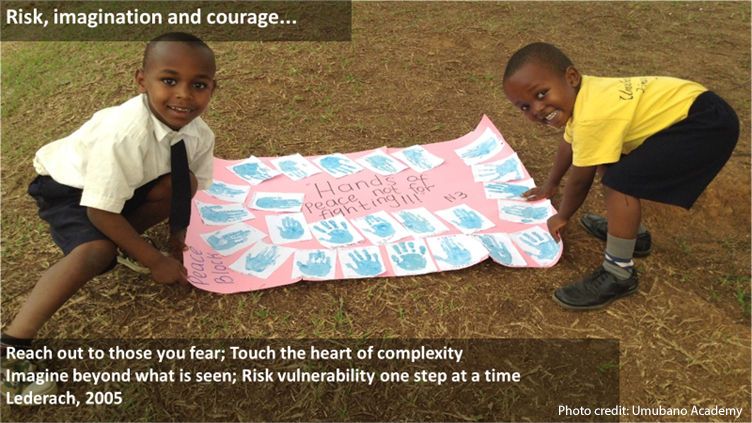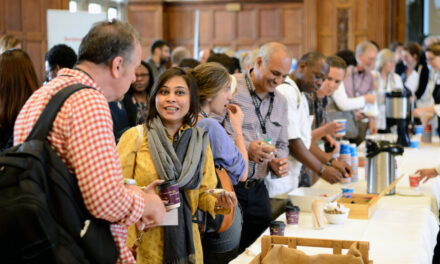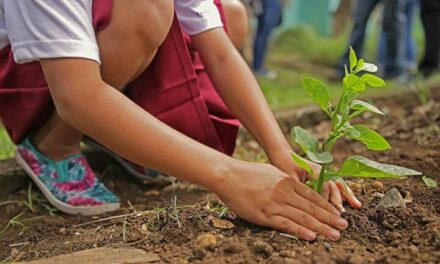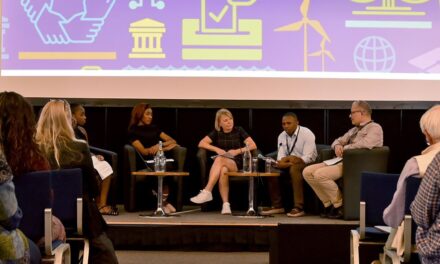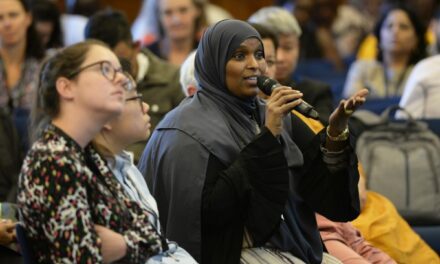This blog was written by Angie Kotler, University of Sussex, and Jean de Dieu Dusingize, Umubano Academy, Rwanda. For the 2023 UKFIET conference, 32 individuals, including Angie and Jean de Deiu, were provided with bursaries to assist them to participate and present at the conference. The researchers were asked to write a short piece about their research or experience.
Our aim in drafting and presenting our paper for the 2023 UKFIET conference, was part of an ongoing reflection process that we have been engaged in for many years. To frame this, we used two paradoxes: the first from Sabaratnum who says: Western liberalism is seen as a source of oppression, but also implicitly understood as the only true source of emancipation; and the second which focuses on ‘paradoxical curiosity’ (Lederach, J.P., 2005, OUP; The Moral Imagination, p35), where we allow moments of tension or dissonance to lead to new understandings.
This process has occasionally been formalised (e.g. as for this paper) but mostly we just seem to continue the conversation whenever we speak. It began almost ten years ago, during the interview for Jean de Dieu’s role as Head Teacher of a school in Rwanda. Angie was asking the questions initially as she was conducting the interview, but it soon became a conversation about our own values, beliefs and passions. Needless to say, Jean de Dieu got the job, and that conversation formed the basis of our working relationship over a long time.
Neither of us was naïve about the power dynamic in the relationship. Angie worked for the organisation that employed Jean de Dieu and part of her role was to bring in the funds to pay him. We reflected on the legacy of the colonial history of Rwanda and the ongoing effects of the genocide of 1994. Trust was hard to come by; mostly people wore a veneer just to manage the pain of the past from an imperative to look to the future. We came at the task of co-developing a model of education for sustainable peace from our vastly different perspectives and experiences. And as we talked about it, we frequently stopped and reflected on moments in our own histories which had influenced us, how we felt, how we thought, what we wanted to do in education and why.
We both believe that these conversations formed the bedrock of the work we collaboratively designed and developed, work which rapidly led to transformative practice in this school, such that within two years, the school became known as the lead school for peace in Rwanda and was held up as shining example by leading peace education organisations and others. We knew we had struck lucky in finding it easy to trust each other and forge genuine mutual respect, and because the organisation was sufficiently small, responsive and agile to allow us to find our own way.
We were so steeped in the work that at first, it was very hard to articulate externally what we had done or were doing, but we realised it was important to try. We used a Life in Schools survey (Arora, 1994, cited in Cremin and Bevington, 2017, Routledge; Positive Peace in Schools, p.124) and that showed high levels of satisfaction from both students and teachers, so we then delved deeper and asked what was it that led to this feeling. For this we used Mac Ginty and Firchow’s Everyday Peace Indicators. Teachers, students and their families reflected back that what they valued in this school was to feel safe and valued, to experience education as just and fair, every day and in every aspect of school life. For every teacher, this was in stark contrast to their own school experience where every single one had been not only been beaten regularly (or had hidden or run away to avoid being beaten) but also, it was often for no good reason. Parents said they had thought beating children was the only way to get them to learn, but now they saw that this was not true and that this would never lead to sustainable peace.
This was a huge step, and we went further, using the 4 ‘R’s social justice framework (Novelli et al, 2015 to explore issues of recognition, redistribution, representation and reconciliation. We never stopped trying to take these as far as we could, even when there were many obstacles and barriers. Jean de Dieu always said however much we learn and change, there is always more. We are still on the journey of exploration of the issues that continue to divide north and south, rich and poor, able and less able, and other polarities. We continue to confront the first paradox almost everywhere we look, and we continue to value our conversations. We know that the power of paradoxical curiosity can occasionally break the mould if we have the humility to allow it.

